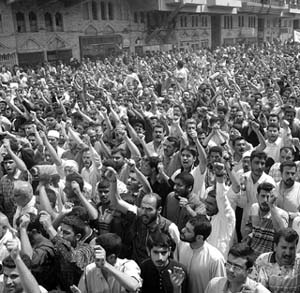|
War Turns Into OccupationU.S. Wants Oil and Bases
|
 |
|
Tens of thousands of Iraqis protest the U.S. occupation in Baghdad on April 18. |
Saddam Hussein's fate, like that of Osama bin Laden, is still unknown. So far, no weapons of mass destruction have been found. Iraq has been devastated. And tens of thousands of Iraqis have taken to the streets to say, "Yes to Freedom, No to America, No to Saddam."
A minimum of 2,000 civilians and many thousands of Iraqi soldiers have been killed. The destruction of water, electrical, housing and food distribution systems will surely multiply the death count. (See "Devastation, Not Liberation," p.4). The war on Iraq is actually now in its thirteenth year and the U.N. estimates the total death toll at over one million.
Washington says it is bringing democracy to Iraq, but most Iraqis, though overjoyed at Saddam Hussein's removal, seem unconvinced.
Talks on forming an interim government are hosted by the U.S. military and involve only handpicked Iraqi "opposition" groups. Ahmed Chalabi, said to be the Pentagon's favorite, has so little local support that he is holed up in an exclusive enclave protected by U.S. troops. In Nasiriyah, outside the talks, 20,000 demonstrators gathered in protest.
Large anti-U.S. occupation demonstrations have been organized throughout Iraq. The press reports that the U.S. military killed at least 32 peaceful protesters and injured hundreds.
Independent Iraqi groups across the political spectrum have been left out. They are calling for genuinely inclusive talks, held under U.N. auspices.
But a genuinely democratic Iraq might not agree to Washington's plans for the country.
According to the New York Times, the U.S. expects to establish four permanent military bases in Iraq. The Times says this "could become one of the most striking developments in a strategic revolution now playing out across the Middle East and Southwest Asia.A military foothold in Iraq would be felt across the border in Syria, and, in combination with the continuing U.S. presence in Afghanistan, it would virtually surround Iran with a new web of American influence."
The State Department has already created an advisory board of consultants to the Iraqi opposition to plan Iraq's oil policy. According to one member, Dara Attar, it proposes to "demonopolize the oil." This is code for the partial privatization of the state oil companies and new exploration by foreign corporations. Ahmed Chalabi says, "American companies will have a big shot at Iraqi oil."
Under this scheme, less of the oil revenues will go to the people of
Iraq and more to foreign corporations. The U.S. will gain effective control
of the flow of oil from Iraq, giving it tremendous political leverage
over OPEC and over all oil-importing countries, like Germany and
China.
According to the London Observer, a pipeline to siphon oil from occupied Iraq to Israel is being discussed. This pipeline "would transform economic power in the region, bringing revenue to the new U.S.-dominated Iraq, cutting out Syria and solving Israel's energy crisis at a stroke."
The U.S. has warned Syria and Iran that if they don't comply with U.S. demands, they may suffer the same fate as Iraq. Washington has made unsupported and ominous claims that both are developing weapons of mass destruction. Such saber rattling is not confined to the Middle East. Recently leaked documents show that Defense Secretary Donald Rumsfeld is now advocating regime change in North Korea.
This new U.S. dominance will also be translated, through the so-called "road map," into further trouble for the Palestinian people. (See "Palestine: Where Will the Roadmap Lead," p.4.) The U.S handpicked new Palestinian Prime Minister Abu Mazen. He was chosen without an election or consultation with the people. The road map is likely to free Israel to continue the process of making the occupation permanent.
U.S. policy in Iraq is also directed at subordinating the U.N. Having contemptuously shoved it aside in the drive to war, Washington now wants the U.N. to participate in--and help pay for--humanitarian relief and reconstruction while control is still exercised by the U.S. military. The U.S. is also attempting, under the guise of "lifting the sanctions," to strong-arm the U.N. into agreeing that Iraqi oil proceeds should be used to pay for Iraqi reconstruction.
By international law the U.S. and the U.K., having waged an illegal war and occupation, are responsible for those costs. The U.S. is trying to turn the U.N. into an enabler for U.S. aggression, cleaning up its bloody messes.
The costs of Iraqi reconstruction are conservatively estimated at $100 billion. After spending hundreds of billions of dollars destroying Iraq for 12 years, this seems like a small price for the U.S. to pay.
Rahul Mahajan is author of "The U.S. War on Iraq: Myths, Facts, and Lies," and a member of the Nowar Collective.
| Month in Review |
|---|
|
August 2010: |
| PAST articles |
Detoit: I Do Mind Empire (USSF Recap) “Bring the War (English) Time for Rebirth: (English) War Weariness, Military Heft, and (English) The Global Military Industrial Complex (English) A Stalled (English) Bush's Iraq “Surge”: Mission Accomplished? Iran: Let's Start with Some Facts Nuclear Weapons Forever (English) Time to End the Occupation of Iraq First-Hand Report from the Middle East (English) Haditha is Arabic (English) A Movement to End Militarism From Soldier to Students Not Soldiers Israel's "Disengagement" U.S. Soldiers Torture: Help Stop Torture — Be All You Can Be: OCTOBER 2006
|
|
War Times/Tiempo de Guerras is a fiscally sponsored project of the |